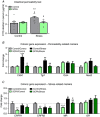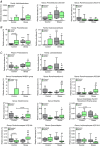Short-chain fatty acids: microbial metabolites that alleviate stress-induced brain-gut axis alterations
- PMID: 30066368
- PMCID: PMC6187046
- DOI: 10.1113/JP276431
Short-chain fatty acids: microbial metabolites that alleviate stress-induced brain-gut axis alterations
Abstract
Key points: Chronic (psychosocial) stress changes gut microbiota composition, as well as inducing behavioural and physiological deficits. The microbial metabolites short-chain fatty acids (SCFAs) have been implicated in gastrointestinal functional, (neuro)immune regulation and host metabolism, but their role in stress-induced behavioural and physiological alterations is poorly understood. Administration of SCFAs to mice undergoing psychosocial stress alleviates enduring alterations in anhedonia and heightened stress-responsiveness, as well as stress-induced increases in intestinal permeability. In contrast, chronic stress-induced alterations in body weight gain, faecal SCFAs and the gene expression of the SCFA receptors FFAR2 and FFAR3 remained unaffected by SCFA supplementation. These results present novel insights into mechanisms underpinning the influence of the gut microbiota on brain homeostasis, behaviour and host metabolism, informing the development of microbiota-targeted therapies for stress-related disorders.
Abstract: There is a growing recognition of the involvement of the gastrointestinal microbiota in the regulation of physiology and behaviour. Microbiota-derived metabolites play a central role in the communication between microbes and their host, with short-chain fatty acids (SCFAs) being perhaps the most studied. SCFAs are primarily derived from fermentation of dietary fibres and play a pivotal role in host gut, metabolic and immune function. All these factors have previously been demonstrated to be adversely affected by stress. Therefore, we sought to assess whether SCFA supplementation could counteract the enduring effects of chronic psychosocial stress. C57BL/6J male mice received oral supplementation of a mixture of the three principle SCFAs (acetate, propionate and butyrate). One week later, mice underwent 3 weeks of repeated psychosocial stress, followed by a comprehensive behavioural analysis. Finally, plasma corticosterone, faecal SCFAs and caecal microbiota composition were assessed. SCFA treatment alleviated psychosocial stress-induced alterations in reward-seeking behaviour, and increased responsiveness to an acute stressor and in vivo intestinal permeability. In addition, SCFAs exhibited behavioural test-specific antidepressant and anxiolytic effects, which were not present when mice had also undergone psychosocial stress. Stress-induced increases in body weight gain, faecal SCFAs and the colonic gene expression of the SCFA receptors free fatty acid receptors 2 and 3 remained unaffected by SCFA supplementation. Moreover, there were no collateral effects on caecal microbiota composition. Taken together, these data show that SCFA supplementation alleviates selective and enduring alterations induced by repeated psychosocial stress and these data may inform future research into microbiota-targeted therapies for stress-related disorders.
Keywords: Behaviour; Chronic Stress; Gut Microbiota.
© 2018 The Authors. The Journal of Physiology © 2018 The Physiological Society.
Figures









References
-
- Arnoldussen IAC, Wiesmann M, Pelgrim CE, Wielemaker EM, van Duyvenvoorde W, Amaral‐Santos PL, Verschuren L, Keijser BJF, Heerschap A, Kleemann R, Wielinga PY & Kiliaan AJ (2017). Butyrate restores HFD‐induced adaptations in brain function and metabolism in mid‐adult obese mice. Int J Obes 41, 935–944. - PubMed
-
- Bernstein CN ( 2017). The brain‐gut axis and stress in inflammatory bowel disease. Gastroenterol Clin North Am 46, 839–846. - PubMed
-
- Berton O, McClung CA, Dileone RJ, Krishnan V, Renthal W, Russo SJ, Graham D, Tsankova NM, Bolanos CA, Rios M, Monteggia LM, Self DW & Nestler EJ (2006). Essential role of BDNF in the mesolimbic dopamine pathway in social defeat stress. Science 311, 864–868. - PubMed
-
- Bharwani A, Mian MF, Foster JA, Surette MG, Bienenstock J & Forsythe P (2016). Structural and functional consequences of chronic psychosocial stress on the microbiome & host. Psychoneuroendocrinology 63, 217–227. - PubMed
Publication types
MeSH terms
Substances
Grants and funding
LinkOut - more resources
Full Text Sources
Other Literature Sources
Medical

